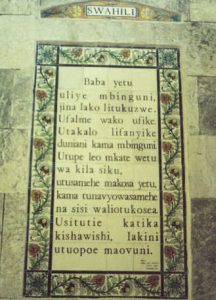By Sarah-Claire Jordan
 If you’re anything like me, the African language you’ve probably heard referenced the most is Swahili. For me, that’s the language that comes to mind when anyone is talking about Central Africa. It turns out, this is the most common language in the African Great Lakes region and Southeast Africa, acting as a lingua franca among the countries of those areas. It is the official language in seven different countries, including Kenya, Uganda, and Tanzania.
If you’re anything like me, the African language you’ve probably heard referenced the most is Swahili. For me, that’s the language that comes to mind when anyone is talking about Central Africa. It turns out, this is the most common language in the African Great Lakes region and Southeast Africa, acting as a lingua franca among the countries of those areas. It is the official language in seven different countries, including Kenya, Uganda, and Tanzania.
However, there is obviously much more to Swahili than just where it is spoken. Here are some facts that will give you a better general understanding of the Swahili language:
1. Swahili is the mother language of the Swahili people
The Swahili people, also known as the Waswahili, are an ethnic group that can be found in the African Great Lakes region. They are descendants of the original Bantu people who first lived in what is now the African Great Lakes region as well as Southeast Africa. Most Swahili people are also Muslim, and you can see a huge Arab influence even in the language, where many Arabic words were borrowed and then became part of Swahili or Kiswahili, another name for it.
2. Wordplay, puns, and more are very common
Swahili is a language full of proverbs, puns, and wordplay in general. Many times those puns are suggestive, but they are usually playful and fun. The lyrical qualities of the language lend it to be used in these ways, which can be seen in the poetry and prose written in Swahili. Swahili poetry is greatly influenced by Arabic poetry, which makes sense since these two cultures were in fairly close contact. Poetry written in Swahili will generally follow the structure of Arabic poetry. Another form of cultural expression where you will find puns, wordplay, and a good representation of how lyrical Swahili can be is in rap in Swahili, known as Swah rap music.
3. Swahili doesn’t have its own script
Swahili was originally written in Arabic script, which wasn’t altered much in order to work better with Swahili. For example, some Swahili consonants that didn’t have an Arabic equivalent were written using the closest Arabic consonant. Today, there is also an alphabet that uses Latin script, but just like the Arabic script, it doesn’t properly accommodate the vowels and consonants of the Swahili language. On top of that, spelling can vary from one Swahili-speaking area to another, further complicating the matter.
4. Swahili has 16 different noun classes
Bantu languages in general always have many different noun classes, with the ancestor of Swahili having about 20 different classes. Swahili today has only 16 classes, divided into about five different groups. Six classes are for singular nouns, five are for plural nouns, one class is used for infinitive forms of verbs that are used as nouns, one class is for abstract nouns, and there are about three classes for nouns dealing with location. There are different prefixes that show which class a noun belongs to.



